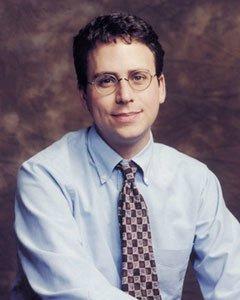BOB GARFIELD: This week, the California Supreme Court denied admission to the state bar for a 41-year-old applicant with sterling education credentials, the highest recommendation of his employer and the unqualified endorsements of a number of legal superstars. But Stephen Glass, the disgraced journalist and subject of the 2003 movie, Shattered Glass, is also a recovering pathological liar, a quality which the court, for reasons known best to itself, did not regard as lawyer material in the Golden State. Here’s the part in the movie where New Republic editor Chuck Lane has finally had enough of all the lies.
[CLIP]:
PETER SARSGAARD AS CHUCK LANE: I want you out of here, and you can’t take anything with you.
HAYDEN CHRISTENSEN AS STEPHEN GLASS: Can I at least shut down my computer?
CHUCK LANE: Don't touch it!
STEPHEN GLASS: I'm in the middle of a file, Chuck!
[CLATTERING SOUNDS]
God -
CHUCK LANE: Back away from the desk.
STEPHEN GLASS: - damn it!
CHUCK LANE: Leave it or I will call Security!
STEPHEN GLASS: Jesus Christ!
CHUCK LANE: Okay?
STEPHEN GLASS: Can I take my Rolodex?
CHUCK LANE: Steve -
STEPHEN GLASS: Can I take my law books?
CHUCK LANE: Sure.
[END CLIP]
BOB GARFIELD: For all the good they did him! Glass is the fabulist who, between 1996 and 1998, wrote more than 40 nonfiction articles, mainly for the Washington-based New Republic, that turned out to be non-nonfiction, despite his sometimes extraordinary efforts to cover his tracks. In the intervening decade, he’s written a confessional roman à clef, called The Fabulist, gone through intensive psychotherapy and graduated with distinction from Georgetown Law School. His mentor there, Law Professor Susan Low Bloch, was one who offered character testimony, and she cannot praise him enough.
PROF. SUSAN LOW BLOCH: He learned his lesson and he’s just – he’s a very smart, very compassionate, very talented person. And he’s – he’s not able to use his talents fully. And I think for that reason, the society is worse off.
BOB GARFIELD: No, really, she can’t praise him enough, because the court was having none of it. Not only was Glass hard pressed to live down his spectacular violation of the 600-year-old legal cannon, Do no Falsehood, he flunked the expiation test. As one justice offered from the bench, the applicant’s ever-more glowing resume is lacking in - public self-abasement.
[HEARING CLIP]:
JUSTICE: What about this redemption, not just successful in what you’ve chosen to do, but finding redemption by giving back in a very particular way to make up for the very particular way in which you were morally wrong? How about just undertaking a crusade through books and appearances and lectures and adjunct professorships, to tell the tale of, of moral failure and moral redemption?
[END CLIP]
BOB GARFIELD: The question had echoes of Cotton Mather, the 17th century Puritan minister and politician who asserted that lawyers must, quote, “Abominate the use of all unfair arts and must scorn and fear conduct that offends the conscience?” Of course, it’s probably worth remembering that Mather was the moral authority behind the Salem witch trials.
It is perhaps surprising that Glass, whose brazen inventions were deeply rooted in careerist cunning, hadn’t himself contrived to mount a perpetual confessional tour. But, instead, he tried to repair his shattered life by embracing the law, first in New York where his application was dead on arrival and for the past five years in California. Considering his demonstrated excellence as a clerk and paralegal, Professor Bloch says the court's decision was harsh, unforgiving and self-righteous.
PROF. SUSAN LOW BLOCH: The judges who have worked with him find him to be an outstanding legal mind. And, of course, the California Supreme Court didn’t dispute that. They seemed to be hung up on the fact he hadn’t done enough pro bono. And, obviously, they didn't want the headline that said, “California Admits a Known Liar that New York Wouldn’t Take.” [LAUGHS]
BOB GARFIELD: Which may actually have been the right instinct. What are laws, after all, but guarantors of trust? There is no rightful place in this country for lawyers who trade cynically on lies, unless, of course, Glass wants to start all over again, in Washington.

